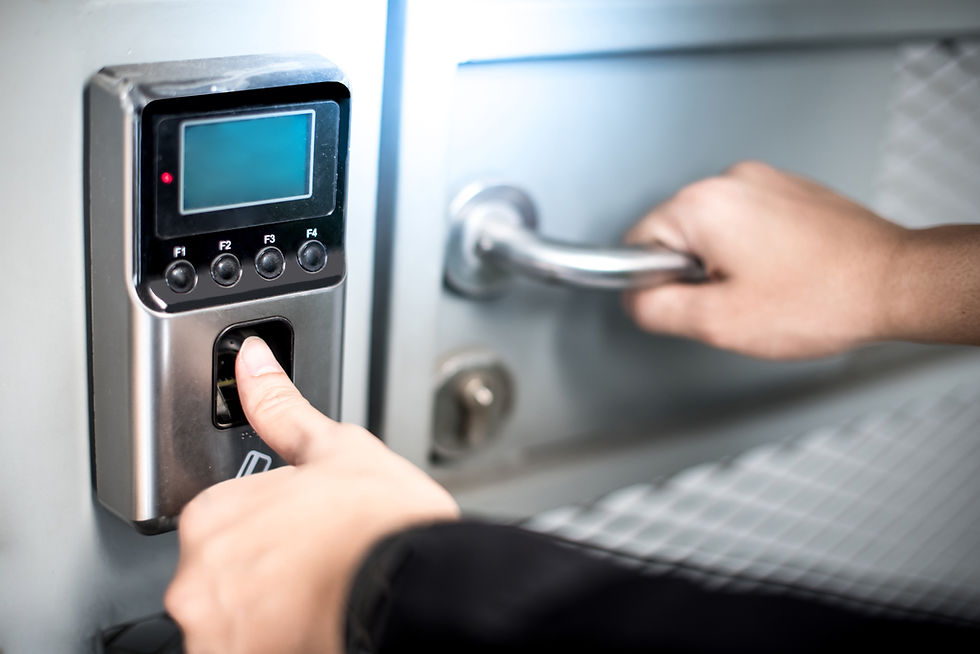Implications of Using Fingerprints for Timekeeping in Ecuador
- Denisse Unda

- May 2, 2024
- 3 min read
By: Atty. Denisse Unda
E-Commerce and Personal Data Protection Department
In the realm of personal data protection, digital fingerprints are classified as highly sensitive and private information. Their management involves the handling of biometric data, which is subject to stricter regulation under national and international laws due to its delicate nature. Improper handling of these fingerprints can result in a violation of privacy and the fundamental rights of individuals.
Given this situation, the Spanish Data Protection Agency (AEPD) has implemented significant measures to ensure the privacy and rights of individuals in the use of biometric data. Faced with uncertainty about the future of biometrics and its potential consolidation as a standard of identification, the AEPD has revised its regulations to prohibit the recording of employee timekeeping using biometric data, including fingerprints. This measure reflects a deep concern for privacy and the security of personal data, promoting the use of less invasive and more privacy-respectful alternatives, such as cards, codes, or mobile applications.
Analysis of the Management of Biometric Data from the Perspective of Ethical and Legal Principles
The management of biometric data, such as fingerprints, requires responsible and cautious handling. It is essential to obtain explicit consent from individuals and adhere to the principles of relevance, minimization, and proportionality. This ensures that the processing is limited to what is strictly necessary and relevant, avoiding excess in its collection, use, or storage.
The processing of biometric data must comply with the principles of legality, loyalty, and transparency. Organizations have an ethical and legal duty to protect this data, ensuring its fair and secure use. It is necessary to adopt a preventative approach, implementing security measures and appropriate management practices to minimize risks of misuse or unauthorized access. Complying with these principles is vital for preserving the privacy and rights of individuals.
Costs and Consequences of Implementing Biometric Registration in Employee Timekeeping
Implementing biometric systems for timekeeping involves significant economic and regulatory compliance costs. This includes the acquisition of high-quality systems and more stringent security measures, which may pose an additional financial burden. Furthermore, the use of biometric data increases the risk of security breaches and privacy violations, which can lead to significant economic and reputational damages. Therefore, it is crucial to evaluate less invasive alternatives and establish control measures to mitigate these risks.
International Examples of Sanctions for Improper Handling of Biometric Data
Internationally, authorities have imposed severe sanctions for failures in the protection of biometric data. For example, the AEPD fined a company €365,000 for violations in the handling of fingerprints. This highlights the need for responsible management of biometric data to avoid sanctions. These sanctions have an impact both nationally and internationally, including jurisdictions like Ecuador. Studying cases like this provides crucial guidance for ensuring the protection of privacy and citizens' rights in a digitalized world.
Conclusion: Ethical and Legal Considerations in the Use of Fingerprints for Timekeeping
The use of fingerprints for timekeeping represents a significant technological advance, but with important ethical and legal implications. Given their value as unique biometric data, their treatment must be careful and respectful of individual privacy. Recent regulations, such as those from the Spanish Data Protection Agency, underscore the need for responsible and privacy-respectful data management practices, seeking a balance between operational efficiency and individual rights protection.
It is essential for companies to thoroughly evaluate the costs and risks associated with implementing biometric systems, taking measures to ensure regulatory compliance and data security. Through responsible management and careful attention to ethical and legal considerations, companies can maximize the benefits of biometric technology while protecting the rights and privacy of their employees.
If you would like more details on how to implement biometric registration systems in your company safely and in accordance with the law, contact us at Meythaler & Zambrano Lawyers for personalized advice.




